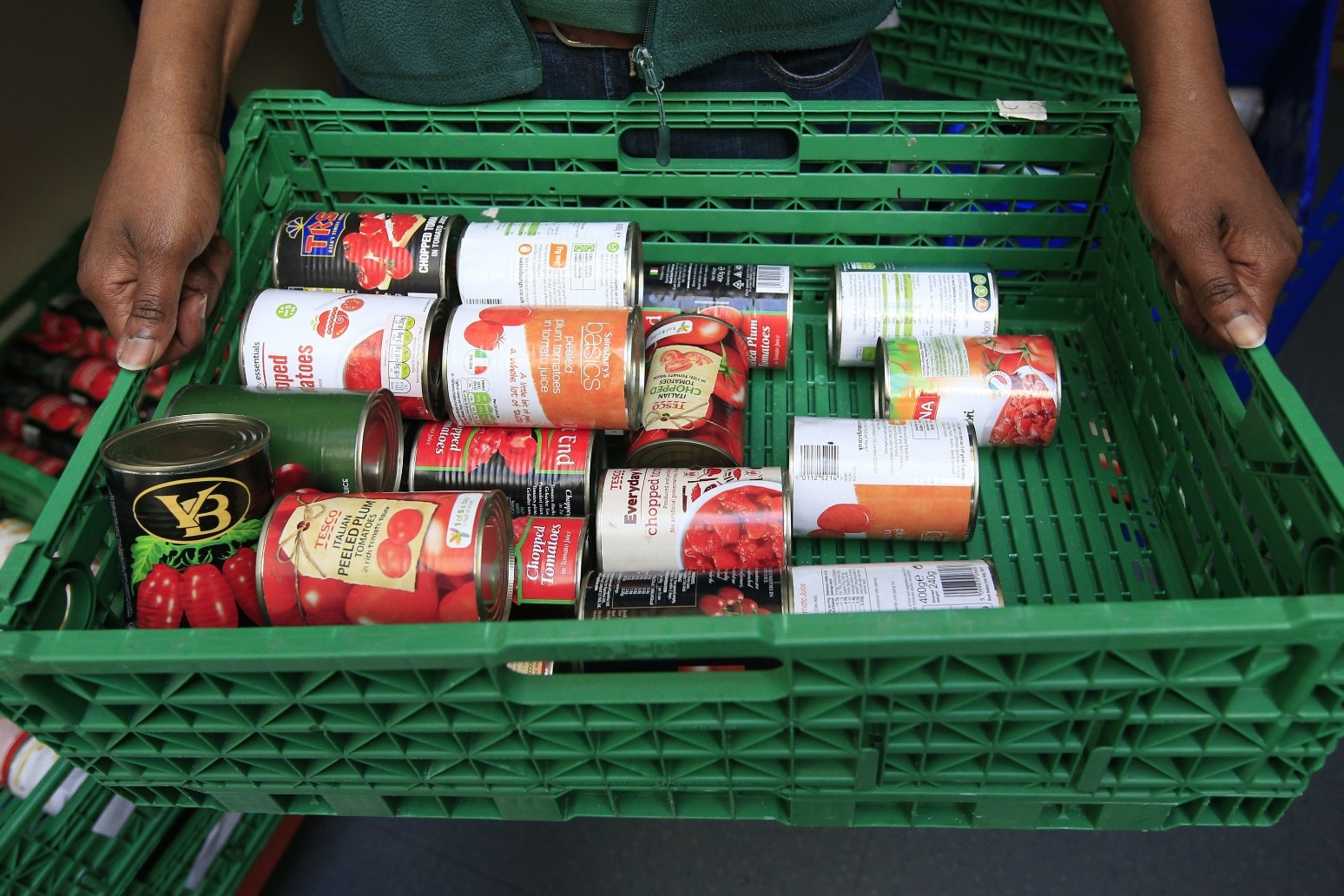
A record near-three million emergency food parcels have been handed out at food banks in the year to March, with the number provided for children topping a million for the first time.
The figures from the Trussell Trust charity represent a 37% increase compared to the previous year.
A total of 2,986,203 emergency food parcels were given out between April 2022 and March this year – the most parcels food banks in the charity’s UK-wide network have ever distributed in a single year.
The number is more than double the amount distributed by food banks in the same period five years ago, the charity said.
Some 1,139,553 parcels were distributed for children, up from 835,879 the previous year and a rise from less than 500,000 in the 2017–2018 year.
In a sign of what the charity said is increasing need amid the cost-of-living crisis, more than 760,000 people – more than the population of Sheffield in the last census – used a food bank in the network for the first time.
This was a 38% rise on first-time users compared to the same period last year.
The charity said the level of need was greater than during the first year of the pandemic, and that there was a particularly high demand in December, with a parcel being distributed by staff and volunteers across the country every eight seconds.
The Trussell Trust said the problem is “not a regionalised issue”, with an increase of at least 28% in each area of the UK – with the highest being in the north east of England, with a 54% rise in the number of parcels being distributed compared to the previous year.
Brian Thomas, chief executive at South Tyneside Foodbank, said the “unprecedented rise” in food bank users coupled with food donations not keeping up has led to a “real pressure cooker situation”.
Of the four nations, Wales had the highest rise at 41%, followed by England at 37%, Scotland at 30% and Northern Ireland at 29%.
In the English regions, the east of England saw the second highest rise after the North East, at 45% followed by the South West at 42%.
The charity said it is the case now that the level of need across the network is “far outstripping the donations that we’ve been receiving”, meaning food banks are having to purchase more food themselves and source more warehouse space to store it.
It said food banks are also having to extend their opening hours to accommodate employed people who need to access their emergency support around their working patterns.
Help from the Government in the form of the Cost of Living Payments – and the support provided in Northern Ireland and Scotland – did result in a temporary dip in need for food banks, the charity said, but the organisation criticised the short-term nature of support.
The charity’s senior research manager Emma Newbury said: “We see that there is some respite with the cost of living payments but that is short-lived and shows that one-off payments are unable to make lasting difference when people’s regular income from social security and work is just too low for them to be able to afford the essentials.”
The charity is calling on the Government to make a long-term commitment that benefit rates will always be enough to afford the essentials, urging that the principle of a minimum Universal Credit to protect people from going without essentials be enshrined in law.
The organisation also said the Government should set out a long-term strategy for local crisis support and commit to a multi-year settlement of funding.
It referred to YouGov online polling of more than 12,000 UK adults on behalf of the Trussell Trust in August and September last year which suggested 77% of respondents think food banks should not be needed in the UK, 93% feeling everyone should be able to buy enough food for themselves and their family, and 85% thinking ensuring everyone has enough money for basic needs should be a high priority for the UK Government.
Newcastle striker and England international Callum Wilson said he and his family relied on food banks growing up and he has now embraced that part of his life.
While he was helping pack food boxes at Gateshead Foodbank in Newcastle, he told the Daily Mirror: “I have realised there’s no shame, that it is a part of my journey.
“A foodbank in Coventry was part of my struggle. Players say to me, ‘Really, that was you?’
“One day some people turned up and gave us food parcels. We didn’t ask but someone had spotted we were in need.
“Mum was saying, ‘Where is it from?’ That proud ego thing, where you want to provide for your own family. That was when she realised we needed help. She gave us all the love, tried her best.
“I also remember we’d have Post Office stamps to get bread and milk.”
The 31-year-old said he is speaking out not to be political but because it is a “humanitarian thing”.
“For me, being a father, reaching 30, you become more open. I am not afraid anymore. Before, it might dent your ego. But now I am embracing it,” he said.
“I am here because foodbanks had a part to play in my life. Why speak out? I have children myself, 10 and 5, they are growing and they think money grows on trees.
“New trainers, click of the fingers. I want to make them and everyone realise we are fortunate and lots of people need help. Most of all, I want to highlight the volunteers here, promote them, help get donations.”
Emma Revie, the trust’s chief executive, said the latest figures are “extremely concerning and show that an increasing number of people are being left with no option but to turn to charitable, volunteer-run organisations to get by and this is not right”.
She added: “For too long people have been going without because social security payments do not reflect life’s essential costs and people are being pushed deeper into hardship as a result.
“If we are to stop this continued growth and end the need for food banks then the UK Government must ensure that the standard allowance of Universal Credit is always enough to cover essential costs.”
Labour’s shadow work and pensions secretary Jonathan Ashworth said the “devastating” increase in emergency food parcels is the “price families are paying for 13 years of Tory economic failure”.
A Government spokesperson said: “We are committed to eradicating poverty and we recognise the pressures of the rising cost of living which is why we have uprated benefits by 10.1% as well as making an unprecedented increase to the National Living Wage this month.
“This is on top of changes already made to Universal Credit which mean claimants can keep more of their hard-earned money – a boost worth £1,000 a year on average.
“We are also providing record levels of direct financial support for the most vulnerable – £1,200 last year and a further £1,350 in 2023/24, with over eight million families starting to receive their first £301 Cost of Living instalment from yesterday – while the Household Support Fund is helping people with essential costs.”
Published: by Radio NewsHub

